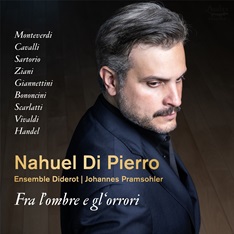Die Basspartien standen in der Barockzeit im Schatten der umjubelten hohen Stimmen, der Kastraten und Tenöre, die oft die großen Helden und schmachtenden Liebenden verkörperten. Die tiefe Stimme wurde und wird auch heute noch – intuitiv – dem Bösen zugeordnet. Zeit mit diesen Vorurteilen aufzuräumen, dachte sich Nahuel Di Pierro und präsentiert auf diesem Album die Vielseitigkeit der wenig beachteten und unterschätzten Bass-Stimme.
Die Auswahl gestaltete sich als schwierig, weil eben im Barock wenig prominente Szenen für die Bass-Stimme komponiert wurden.
Nahuel Di Pierro gelingt es jedenfalls nachdrücklich, sein Fach ins rechte Licht zu rücken. Er braucht dabei nicht auf irgendwelche Kunstgriffe oder stimmliche Extravaganzen zurückzugreifen. Sein Bass klingt gleichermaßen kraftvoll und natürlich, geht bruchlos von höheren Registern in die Tiefe, ohne dabei an Klang und Ausstrahlung zu verlieren. Seine Artikulation ist äußerst agil und leichtfüßig. Sie erbringt den Beweis, dass man auch mit einer feinen tiefen Stimme filigran schwebende Vokalisen singen kann. Und so paaren sich Ausstrahlung und Virtuosität sowie darstellerischer Facettenreichtum in einer beeindruckenden Symbiose.
In the Baroque era, the bass parts were overshadowed by the acclaimed high voices, the castrati and tenors, who often embodied the great heroes and pining lovers. The low voice was and still is – intuitively – associated with evil. Nahuel Di Pierro thought it was time to do away with these prejudices and presents the versatility of the little-noticed and underestimated bass voice on this album. The selection proved difficult because few prominent scenes were composed for the bass voice in the Baroque period. In any case, Nahuel Di Pierro succeeds emphatically in putting his subject in the right light. He does not need to resort to any tricks or vocal extravagances. His bass sounds equally powerful and natural, moving seamlessly from the higher registers to the lower without losing sound or charisma. His articulation is extremely agile and light-footed. It proves that it is possible to sing delicate, floating vocalizations with a fine low voice. And so charisma and virtuosity as well as the richness of the performance are combined in an impressive symbiosis.




















